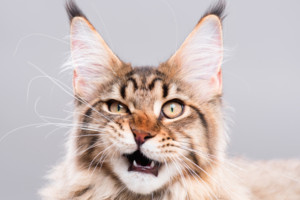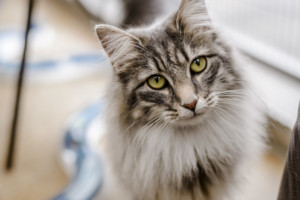FeLV can be a bit of a scary word, but in reality its not so scary! We’ve decided it’s time to set the record straight! So, what exactly is FeLV?
FeLV, or Feline Leukemia Virus, is a moderately common infectious disease in cats. It is commonly found in environments where many cats are living together, as it can be spread fairly easily. Infected cats can spread the disease through saliva, milk, feces, and urine, and the most common pathway to infection is via saliva. FeLV can easily be spread through casual grooming, licking or biting, shared dishes, and shared litter pans. Additionally, an infected mother can transfer the disease to her kittens while they are in utero. However, it’s important to note that FeLV is NOT transmissible to people, dogs, or any other animals.
What does FeLV look like?
Well, it actually depends on the infected cells, so the signs and symptoms of FeLV can vary greatly depending on the specific cat. Some of the symptoms associated with FeLV are:
Fever
Inappetence
Weight Loss
Lethargy
Poor Coat or Fur Condition
Enlarged lymph nodes
Pale gums
Infections of the skin, bladder, and upper respiratory systems
Additionally, there are many FeLV associated diseases, including:
Anemia
Liver disease
Intestinal disease
Lymphoma
Chronic respiratory infections
Chronic inflammation of the gums and mouth
Poor healing of wounds
How Can I Tell if My Cat Has FeLV?
There is a simple blood test, performed by any vet, that can tell you if your cat is FeLV +. Every single cat in a shelter receives a SNAP test to determine whether or not they are FeLV +, so if you are adopting from a shelter, you will have a definite answer right away! If you have an indoor-outdoor cat, it’s a great idea to get them tested frequently – particularly if you don’t know who they meet when they’re outside living their second life. Keep in mind, it may take anywhere from 60-90 days after exposure for FeLV to show up in a cat’s system, due to the nature of the virus.
How Do I Treat FeLV??
AS far as preventatives go, there is a vaccination against FeLV. Vets generally recommend that every cat is vaccinated, but particularly kittens due to their lowered immune system, and cats who have access to outdoors.
Unfortunately, there is no cure for FeLV. But, if a cat does test positive, it can be managed! It is advised that the cat stay inside always to prevent the spread of the disease. Additionally, any/all secondary illnesses and symptoms can be managed as they arise. Partnering with a great vet is an excellent first step, and staying in constant communication with check-ups is vital. Otherwise, cats who are FeLV+ can absolutely live happy and fulfilled lives!
